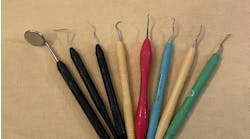Thursday Troubleshooter: How should team handle dentist who's declining cognitively?
QUESTION: I believe my dentist may have some cognitive issues and I don’t know what to do about it. I really do not want to report him to the state board of dentistry. I’m a nurse and I do home health care work with seniors. My dentist has some memory problems, he seems scattered, and he has some personality changes, and this is worse at the end of the day. My experience tells me he is having some early signs of dementia. Even his receptionist acknowledged the changes in him. His practice is getting smaller, as some long-time patients have stopped going to him, and I don’t think he’s taking new patients. I’m not sure he should be practicing at all. I’m pretty sure he is in his 70s. Do you have any suggestions?
ANSWER FROM SUSAN A. SPEAR:SAS Transitions Dental Practice Brokers
I see many dentists who practice into their 70s who still have their cognitive skills and clinical ability. Although age can be a factor in dementia, with so much more focus on good lifestyle behaviors, dentists, like many other seniors, are working longer.
However, what you are describing sounds like a serious situation for your dentist, and it should be addressed. As a first step I would recommend approaching a family member, such as a son or daughter of the dentist, with these concerns. Along with the dental staff, you could create your own intervention by contacting those who care about him and would be able to remain objective about the situation. The spouse may not be in a position to do that, or just may not see the same changes.
If this is not effective, another resource is often your state dental association. Most of these organizations have a peer assistance program where all communication is kept confidential. You can contact the peer assistance group and report what you think is happening. The role of peer assistance is to help dental professionals with these types of issues without affecting their reputations or careers.
From a transitional position, many dentists decide to work until they close the practice doors. In this instance it sounds as though this practice is definitely being compromised by the changes in the dentist’s behavior and skills. Based on your comments, the sooner someone, to quote Linda Miles, “lovingly confronts” this issue with the dentist, the sooner he can receive the care he needs, and the sooner the situation can be resolved.
ANSWER FROM ALLEN SCHIFF, CPA, CFE,
Schiff & Associates
This is very difficult issue. Some older dentists continue to work, maybe for the love of dentistry, because they need the money, or maybe because they want to stimulate their minds and not waste away in front of the TV. Nevertheless, when a patient’s safety and treatment are at risk due to the care (or lack thereof) from the dentist, the dentist himself needs to look in the mirror and determine whether he’s placing patients under unnecessary risk.
Maybe the easiest way to handle this difficult situation is to gather a number of long-standing patients together and have a heart-to-heart with the dentist. This group of long-standing patients could be classified as the “dentist executive committee.” This committee could encourage the dentist to stop treating patients soon, while he can still preserve the value of his dental practice, with the hope of selling the practice and enjoying the financial benefits of the sale, before there is nothing to sell.
Good luck to you.
ANSWER FROM LEIGH ANNE BOWLING, JD, LLM: Law Office of Leigh Anne Bowling
Someone should approach his wife or other family member with this information in an understanding and delicate way. The dentist does not want to end up with a malpractice claim!
PAST THURSDAY TROUBLESHOOTERS:
New employee in dental practice suspects embezzling
How can front office convince dentist to bring in outside/expert help?
Dentist in Egypt asks, group or solo practice?
Send your questions for the experts to answer. Responses will come from various consultants associated with Speaking Consulting Network, Academy of Dental Management Consultants, or Dental Consultant Connection. Their members will take turns fielding your questions on DentistryIQ, because they are very familiar with addressing the tough issues. Hey, it's their job.
Send your questions to [email protected]. All inquiries will be answered anonymously every Thursday here on DIQ.







